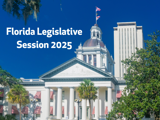
2025 Legislative Outcomes
SB 296: Middle High School and High School Start Times
What it does: Allows a school district to comply with new requirements for later school start times by providing a report listing start times for all schools in the district, documentation of district plans to implement new times, the impact of those changes, and any unintended consequences.
What it means for you: Florida changed school start times as of July 1, 2026, to no earlier than 8 a.m. for middle schools and no earlier than 8:30 a.m. for high schools. This allows districts to postpone that deadline while it provides the state with feedback on the costs and benefits.
SB 1070: Electrocardiograms for Student Athletes (Second Chance Act)
What it does: Adds electrocardiograms to mandatory medical evaluations for student athletes:
- Beginning in 2026-2027 school year, high school students participating in interscholastic athletic competition or trying out for a team must complete at least one ECG screening that meets standards established by the FHSAA’s Sports Medicine Advisory Committee
- Requires the FHSAA to prohibit student athletes from participating if they receive an abnormal ECG report
- Allows an ECG completed up to two years prior to the 2026–2027 school year to satisfy the requirement
- Allows medical practitioners with out-of-state licenses to evaluate students
- Parents/guardians may get exceptions if they object in writing due to religious beliefs, or if a board-certified physician certifies the student for a medical exception
- Exempts students from the requirement if they live in school districts that fail to obtain a public or private partnership to provide ECG screening for less than $50 per student
- Establishes that if a student is exempted from an ECG, the school district is not liable for cardiac-related injuries or death from interscholastic athletic participation
What it means for you: More medical screening for student athletes.
SB 1374: School District Reporting Requirements
What it does: Improves reporting and accountability for teacher arrests or misconduct:
- Requires district school boards to adopt a policy for the temporary removal of teachers from the classroom within 24 hours of an arrest for a felony or misdemeanor offense when notified by law enforcement or by self-reporting
- Expands law enforcement notification requirements to include additional disqualifying offenses
- Expands self-reporting requirements to include more offenses and requires instructional and administrative personnel to report an arrest within 48 hours
- Clarifies that self-reports are not admissions of guilt and cannot be used against the employee in any civil, criminal, administrative, or judicial proceeding.
What it means for you: Faster removal of teachers who have been arrested.
SB 1470: School Safety
What it does: Seeks to strengthen school safety measures.
- Changes school security guard training and certification requirements to align with school guardians, requires that they be trained and approved by a sheriff, and requires guards in private schools to meet the same requirements
- Requires employment and disciplinary actions for guards to be reported to the Florida Department of Law Enforcement (FDLE)
- Mandates that security guards submit the results of the required psychological evaluation to the sheriff for review
- Allows school districts to use firearm detection dogs for school security
- Starts the process for the establishment of a Florida Institute of School Safety
- Requires the Department of Education to establish and maintain a centralized system that integrates panic alert systems and digital school maps used by public schools.
What it means for you: Better-trained school security guards, more accountability.
SB 2510: Prekindergarten Through Grade 12 Education
What it does: Changes appropriations for prekindergarten through grade 12 education to align with the new state budget:
- Changes how state allocations to educational programs are calculated
- Removes the Florida Education Finance Program (FEFP) Allocation Conference and requires the Department of Education to recalculate and resubmit FEFP data to get allocations to school districts released
- Replaces the weighted full-time equivalent funding for certain acceleration options with a new Academic Acceleration Options Supplement as a categorical in the Florida Education Finance Program (FEFP)
- Requires Schools of Hope program funds to be maintained at $25 million or more, starting July 1, 2027
- Changes the definition of "persistently low-performing school" to include a school in the bottom 10% in at least two of the three years for student performance for grade 3 English Language Arts or grade 4 mathematics
- Removes new student eligibility for the New Worlds Scholarship Accounts program and requires accounts to be closed after one year of inactivity, rather than three
- Modifies the CAPE Digital Tool certificates and industry certifications and establishes the CAPE Pathways industry certifications
- Requires the DOE to make recommendations by July 1, 2028, on a Title I performance incentive program
- Authorizes the school district reading plan to include parent resources for struggling students and information about student eligibility for the New Worlds Reading Initiative
What it means for you: Additional resources for charter schools operated by hope operators, potentially less funding for International Baccalaureate, Advanced Placement, Advanced International Certification of Education, and Dual Enrollment programs, according to FloridaPolicy.org.
SB 1102 — School Readiness Program
What it does: Expands the criteria for eligibility for children with special needs served in the School Readiness (SR) program, providing specific accountability and training criteria for SR providers to be eligible to receive the special needs differential allocation.
What it means for you: The current law prioritizes children in certain disadvantaged conditions. This bill adds children who require additional accommodations beyond those required by the Americans with Disabilities Act. Still, it requires them to be validated by a health care professional, a licensed mental health professional, or an educational psychologist, and requires an IEP and an IFSP to determine the child’s eligibility for accommodations.
HB 1105 — Education
What it does: This education omnibus bill covers a lot of ground, with many of the measures affecting charter schools. Among other things, it:
- Adds restrictions on wireless communication devices for students
- Requires a test program in six school districts for banning phones in high schools from bell to bell
- Allows students in marching bands to get physical education or performing arts credit
- Requires the Department of Education to develop integrated courses that allow students to earn credit in both career education courses and required classes for high school graduation
- Expands eligibility to the Bright Futures Scholarship Program
- Allows a majority of parents or guardians to decide to convert a public school to a charter school without input from the school teachers or administrators
- Allows municipalities to apply to convert existing public schools into job engine charter schools
- Requiring school districts to share discretionary surtax revenue with charter schools
- Allows some private schools to build new facilities without seeking rezoning
- Moves the Council on the Social Status of Black Men and Boys from the Department of Legal Affairs to Florida Memorial University
- Authorizes a law enforcement officer to arrest a person without a warrant when there is probable cause to believe that the person has trespassed upon school grounds or facilities
What it means for you: Students in elementary and middle schools are prohibited from phone or tablet use from bell to bell and at school functions. High school students may not use phones or tablets in class unless directly requested by a teacher, in a designated area. A majority of parents may decide to convert a school into a charter school, without teacher or administrator input.
HB 1145 — Workforce Education
What it does: Expressly authorizes charter schools to receive funds under the Workforce Development Capitalization Incentive Grant Program, requires school districts and Florida College System institutions to expand money-back guarantee programs to cover six workforce education programs instead of the current three.
What it means for you: More money for charter schools, more emphasis on workforce programs.
HB 1255 — Education
What it does: Makes more changes to the school system.
- Changes the definition of “economically disadvantaged” for families seeking School Readiness services to use “state median income” instead of “federal poverty level”
- Requires that school districts get parental consent before using corporal punishment
- Adds more support for math instruction
- Establishes new screening requirements for certain private schools
- Expands authority to buy emergency opioid overdose drugs and protects school employees from liability for administering them
- Makes several other clarifications.
What it means for you: It may become harder to qualify for School Readiness services, and no one can hit your kid without your advance permission.
HB 443: Education
What it does:
- Allows high-performing charter schools to create their own codes of conduct or adapt them from other schools
- Defines what lab schools can spend discretionary funds on
- Allows certain charter schools to enroll more students than their charter specifies
- Prevents the landlord of a charter school or anyone closely connected with them from being on the governing board
- Allows virtual students to participate in an interscholastic athletic team in the school district where they live, and more.
Legislators Debate Career and Technical Program Funding
HB 5101 and SB 2510 - Career and Technical Programs
As the 2025 Florida Legislative Session heads toward the finish line, House Bill 5101 and Senate Bill 2510 have emerged as the latest pieces of legislation that could impact programs for students who look for opportunities to earn college and career credentials.
Background
In House Bill 5101, the Florida legislature proposes revising Florida Statute 1011.62, which pertains to additional program funding for full-time enrollment of students in Advanced Placement (AP), International Baccalaureate (IB), Cambridge (AICE), Dual Enrollment (DE), and Career and Professional Education (CAPE).
How are those programs currently funded:
The AP, IB and Cambridge ICE programs are funded at $852 per student for each course they take for 2024-2025. For each student who passes the exam, the state has provided an additional $852 to the district. All the funds are used for the programs in the form of teacher salaries, professional development, course materials, exam fees for students, and other program-related expenses.
What changes?
Districts will still receive the initial $852 per student enrolled to cover the course costs. What changes is how the additional funds are allocated. Instead of just passing the exam to trigger the additional $852 per student funding, students will have to score above a yet-to-be-determined threshold for the district to receive $426 to be used towards program costs.
The remaining $426 that was previously designated for the AP, IB, AICE, DE, and CAPE programs based on student performance will be left to the discretion of the school board to spend as they see fit. Districts could choose to continue to use those funds for the programs, or they may decide to use them in other areas.
How will these cuts affect those programs?
By removing the requirement that the full $852 be spent on these programs, school districts could allocate funds that previously went to the programs to other areas of their budgets. However, they are not required to do so and could continue to use the full $852 per student they receive for student performance to cover program expenses. In addition, by adding a threshold score requirement, districts could lose funding they would have previously received from students passing the exams.
How is DCPS responding?
DCPS is advocating that the full $852 per student allocation for student performance on the exams be used to fund AP, AICE, IB, DE and CAPE, as teachers, programs, and students could be impacted by cutting designated funding.
What can you do?
Please share any comments or concerns you may have with your legislators. They welcome hearing from constituents, particularly if you have a personal impact story related to this legislation.
JPEF Manager of Policy and Data explains HB 5101:
News Stories About HB 5101
Florida Times Union: Florida budget votes opens questions about schools' college prep, career training funding
Florida Politics: Column from Sen. Danny Burgess (R-Zephyrhills), A fiscally responsible approach to K-12 funding and flexibility in Florida
2025 Legislative Session
The Florida 2025 Legislative Session will convene on March 4, 2025.
Gov. Ron DeSantis has called for a special session to address immigration, condominium regulation, agricultural relief in response to natural disasters, replenishing the My Safe Florida Home program, and the citizens’ initiative petition process.
JPEF is tracking education legislation here.
The Duval County School Board has adopted its legislative agenda, which includes more funding for transportation, strengthening workforce development through career and technical education, and more flexibility in requirements for teacher certification.
Research on DCPS Agenda Items
What does research say about the Duval County Public School legislative agenda? Follow the links below to learn more about the research behind the policies.

Flexible Certification Requirements
Flexible Certification for Teacher Recruitment and Retention

School Safety and Funding for New Mandates
Advocate for adequate funding to implement new state-mandated school safety initiatives. Read More

Increased Funding for Transportation Services
Advocate for enhanced funding for transportation services, seeking an increase—potentially covering the full cost—within the Transportation Categorical of the Florida Education Finance Program (FEFP).

Strengthen Workforce Development Through Career and Technical Education
Duval County Public Schools urges the Florida Legislature to include CAPE Digital Tool certifications in the middle school grading formula as acceleration points, fostering essential technology skills and advancing workforce readiness statewide.

Supporting FSBA's Priorities for Advancing Education
Autonomy on School Start Time & Funding of VPK

